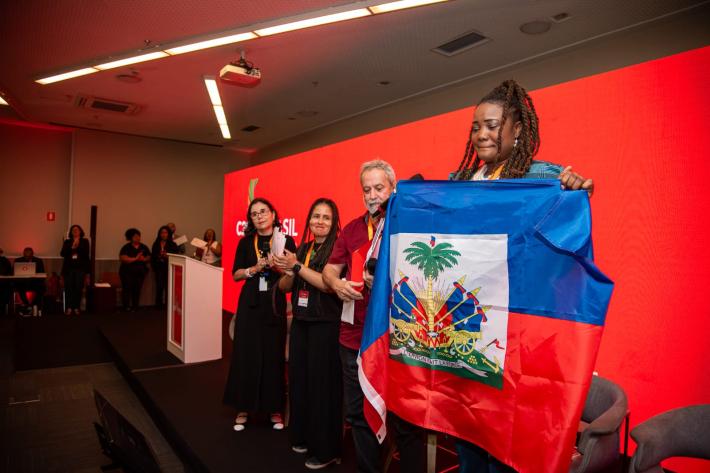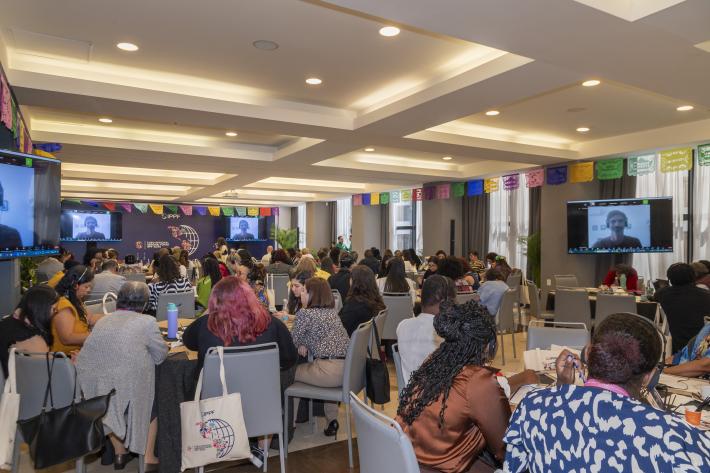Latest press releases
A selection of stories from across the Federation
Americas & the Caribbean
Breaking: IPPF Global Research Exposes Devastating Impact of the Trump Administration
Over Half of Partners and $85 Million Affected
For media enquiries


| 27 March 2025
We condemn Trinidad and Tobago’s Upholding Criminalization of Same-Sex Activity
The Trinidad and Tobago Court of Appeal’s decision to uphold the criminalization of consensual same-sex activity is an alarming assault on human rights. This ruling, which reinstates the criminality of private, consensual intimacy, is a direct violation of the fundamental rights of LGBTQI+ people and a stark reminder of the colonial-era laws that continue to inflict harm across the Caribbean. IPPF Americas and the Caribbean Regional Office (ACRO) together with local member Family Planning Association of Trinidad and Tobago (FPATT) stand unequivocally with LGBTQI+ communities in Trinidad and Tobago and across the region. We reject this ruling and any legislation that denies people their right to love freely and live with dignity. This decision reflects a justice system with oppressive statutes that have no place in a just and democratic society. According to Eugenia López Uribe, Regional Director of IPPF ACRO, this ruling is not just a setback for LGBTQI+ rights, it is an attack on human dignity: “It is a deliberate attempt to silence, criminalize, and exclude a part of citizens and people living in the country. But let this be clear: IPPF regional office in the Americas and the Caribbean will continue fighting for and with the LGBTQI+ movement so they won’t be silenced. IPPF will not back down. LGBTQI+ people’s rights are non-negotiable. " Criminalizing LGBTQI+ lives perpetuate violence, discrimination, and stigma. It emboldens hate, undermines access to justice, and creates a climate of fear where LGBTQI+ individuals are forced to live in further vulnerability. Research published by CAISO: Sex and Gender Justice’s Wholeness and Justice programme in 2023 indicate that 1 in 3 LGBTQI+ individuals in Trinidad and Tobago experience discrimination and harassment, 1 in 4 face family violence, and 1 in 4 experience physical assault. “FPATT [Family Planning Association of Trinidad and Tobago] notes the recent Court of Appeal decision that affirms an old law before independence that criminalizes persons of a different orientation, due to a technicality- the saving law clause,” says Professor Rose Marie Antoine, FPATT’s Board of Trustees President. “Interestingly, the British colonial masters that drafted that law have long abolished it. We note too that this was not a unanimous court decision. FPATT looks forward to the day when our legal system and laws can reflect true equity and non-discrimination, serving all our nation’s peoples in their access to fundamental rights and protecting vulnerable groups from harm and violence. FPATT will continue to welcome and serve all people regardless of their sexual orientation.” We call for urgent action: The immediate repeal of Sections 13 and 16 of the Sexual Offences Act. A commitment from Caribbean governments to decriminalize same-sex relations and protect LGBTQI+ individuals from discrimination and violence. An end to the use of colonial-era "savings law" clauses to justify human rights violations. Now is the time for every human rights defender, policymaker, and ally to take a stand. LGBTQI+ people in Trinidad and Tobago—and across the Caribbean, our region and the world—deserve justice, equality, and the freedom to live without fear. IPPF will not stop until that is a reality. For more information, please contact [email protected] - +44 7918 845944 About the International Planned Parenthood Federation IPPF is a global healthcare provider and a leading advocate of sexual and reproductive health and rights (SRHR) for all. Led by a courageous and determined group of women, IPPF was founded in 1952 at the Third International Planned Parenthood Conference. Today, we are a movement of 158 Member Associations and Collaborative Partners with a presence in over 153 countries. Our work is wide-ranging, including comprehensive sex education, provision of contraceptive, safe abortion, and maternal care and responding to humanitarian crises. We pride ourselves on being local through our members and global through our network. At the heart of our mission is the provision of – and advocacy in support of – integrated healthcare to anyone who needs it regardless of race, gender, sex, income, and crucially no matter how remote.

| 16 October 2023
IPPF ACRO express concern over guidance of the Zambian Ministry of Health who advised against the use of the term “sexual and reproductive health and rights”.
At a time of profound and multiple crises, it is worrying that the focus of any government's action is to go back on already consolidated international commitments, particularly those which recognize, based on evidence, that Sexual and reproductive health and rights (SRHR) are fundamental human rights, central to eradicating poverty and achieving sustainable development across its social, economic, and environmental dimensions. SRHR – which encompasses a range of issues, including universal access to SRH services and supplies, comprehensive sexuality education, and ending gender-based violence and harmful practices such as early, child and forced marriage – are fundamental to the ability of all people, especially women, adolescent girls and young people, to lead full, satisfying, healthy and productive lives. SRH services are a critical aspect of SRHR, but a complete understanding of sexual and reproductive health and rights goes far beyond on access to health facilities and services to include an array of social, legal, institutional, and financial arrangements that enable individuals to exercise their rights in general and addresses the underlying social determinants. In this regard, our Latin American community urges the government of Zambia to review its position and, on the contrary, to improve and expand the SRHR services, including increasing funding in this sector, for example by investing in fulfilling the human rights of women and girls, in all their diversity, as gender discrimination is one of the leading determinants of poor health and unwanted SRHR outcomes. It is also key to addressing inequities in access due to poverty and multiple forms of discrimination, stigma and social and economic exclusion affecting various population groups. We conclude by highlighting the importance of evidence-based policies and, in 2023, the data indicates that effective policies are not those based on stigma and discrimination or elimination of rights. On the contrary, effective policies are those that include, care for, and treat all people as subjects of rights, capable of making decisions about their health and reproductive life, with the support of a State committed to promoting citizenship and the human dignity of their people. Here, at IPPF ACRO, we will remain attentive and always willing to contribute so that rights do not go backwards and no one is left behind. In solidarity, Eugenia Lopez Uribe Regional Director for the Americas and the Caribbean

| 25 February 2022
Statement on the escalating conflict in Ukraine
Following the disturbing reports coming out of Ukraine, IPPF has released a media statement on behalf of the Federation and its Member Association in Ukraine. Despite the fact that sexual and reproductive healthcare (SRHR) needs increase significantly during conflict and humanitarian situations, the significant vulnerabilities of affected populations and displaced people are often overlooked, especially the experiences of women, girls and marginalized populations who are at increased risk of unintended pregnancy, sexually transmitted infections and sexual and gender-based violence. IPPF’s Director-General, Dr Alvaro Bermejo, said: "The International Planned Parenthood Federation (IPPF) is deeply concerned about the escalation of conflict in Ukraine. We take our responsibility to preserve the enormous gains made in life-saving sexual and reproductive healthcare across the country very seriously, especially for women, girls and marginalised populations, whose vulnerability and experiences are so often overlooked in humanitarian situations. "For 20 years, IPPF has consistently worked to strengthen and protect the reproductive rights of people in Ukraine, working in the frontline conflict zones of Lugansk and Donetsk since 2014, training medical specialists to provide life-saving reproductive healthcare, psychosocial support and quality care to survivors of sexual and gender-based violence. “Our teams are now contingency planning across the region to address not only the needs of those still in Ukraine, but also the millions who are likely to be displaced by the conflict and who will require critical support to continue accessing healthcare. We will work closely with partners and other NGOs to ensure the least possible disruption to services. "IPPF stands in solidarity with the international community and the brave people of Ukraine who for the last eight years have faced terrifying and difficult circumstances that nobody should ever have to suffer through. We stand by IPPF's frontline team, who, despite the dangers, continue to facilitate life-saving healthcare for those who need it most. We will be monitoring the situation closely to ensure the safety of our colleagues across the region.” For European outlets, please contact [email protected] For UK and other international media outlets, please contact Karmen Ivey on [email protected] or [email protected]
















